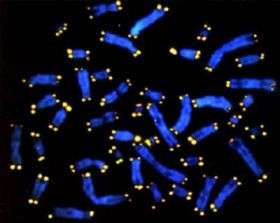Scientists identify mechanism behind mind-body connection

Every cell contains a tiny clock called a telomere, which shortens each time the cell divides. Short telomeres are linked to a range of human diseases, including HIV, osteoporosis, heart disease and aging. Previous studies show that an enzyme within the cell, called telomerase, keeps immune cells young by preserving their telomere length and ability to continue dividing.
UCLA scientists found that the stress hormone cortisol suppresses immune cells' ability to activate their telomerase. This may explain why the cells of persons under chronic stress have shorter telomeres.
The study reveals how stress makes people more susceptible to illness. The findings also suggest a potential drug target for preventing damage to the immune systems of persons who are under long-term stress, such as caregivers to chronically ill family members, as well as astronauts, soldiers, air traffic controllers and people who drive long daily commutes.
"When the body is under stress, it boosts production of cortisol to support a "fight or flight" response," explains Rita Effros, professor of pathology and laboratory medicine at the David Geffen School of Medicine at UCLA, and a member of the Jonsson Cancer Center, Molecular Biology Institute and UCLA AIDS Institute.
"If the hormone remains elevated in the bloodstream for long periods of time, though, it wears down the immune system. We are testing therapeutic ways of enhancing telomerase levels to help the immune system ward off cortisol's effect. If we're successful, one day a pill may exist to strengthen the immune system's ability to weather chronic emotional stress."
The research was published in the May issue of the peer-reviewed journal Brain, Behavior and Immunity.
Source: University of California - Los Angeles




















